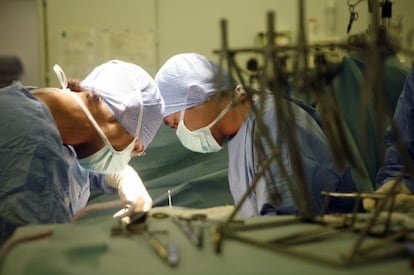Five arrested in Spain’s first case of human organ trafficking
Organization allegedly paid poor migrants up to €40,000 to donate their kidneys or liver parts

In the first bust of its kind in Spain, judicial police in Valencia arrested five people – all non-Spaniards – who were allegedly involved in a major human organ trafficking ring.
The case broke after a rich 61-year-old Lebanese man had tried to use the organization for a liver transplant. It was not immediately clear when the arrests were made.
In 2012, an NGO alerted authorities that a group was offering high sums of money to migrants without papers to purchase their vital organs, such as kidneys and sections of liver. Around the same time health authorities in Valencia detected that a group of people was undergoing complicated procedures at a private clinic.
A 2010 Penal Code reform prohibits anyone in Spain from buying or selling human organs. All such procedures are regulated by the National Transplant Organization (ONT), which compiles waiting lists and seeks donors. Under the law, organs can be donated by family members of dead loved ones or by people who wish to leave them when they die. But the ONT has strict guidelines for such transplants as well as for donors.
Last year, more than 4,200 legal transplants were conducted in Spain with kidneys and liver the organs most frequently substituted.
The man from Lebanon, who was not identified but was also arrested in the sting, holds an important political position in his country and had traveled to Spain after he reportedly contacted the group. Lebanese health professionals had told the man of the advanced organ transplant procedures that take place in Spain.
A number of people – the exact figure was not given by sources in the case – underwent tests that cost as much as €15,000 at the private clinic to determine their compatibility with those needing transplants.
The majority of the migrants who offered their vital organs were poor. One woman was a perfect match and was willing to donate part of her liver for the sick man in exchange for €40,000. At first, the Lebanese man was happy with the deal but backed down when he found out the donor was a woman; he considered that accepting the transplant would be going against his Islamic beliefs.
The Lebanese man was eventually able to receive his transplant in a legal operation – one of his children donated part of their own liver – but he was arrested in Madrid after traveling there to undergo medical examinations after the procedure.
Tu suscripción se está usando en otro dispositivo
¿Quieres añadir otro usuario a tu suscripción?
Si continúas leyendo en este dispositivo, no se podrá leer en el otro.
FlechaTu suscripción se está usando en otro dispositivo y solo puedes acceder a EL PAÍS desde un dispositivo a la vez.
Si quieres compartir tu cuenta, cambia tu suscripción a la modalidad Premium, así podrás añadir otro usuario. Cada uno accederá con su propia cuenta de email, lo que os permitirá personalizar vuestra experiencia en EL PAÍS.
¿Tienes una suscripción de empresa? Accede aquí para contratar más cuentas.
En el caso de no saber quién está usando tu cuenta, te recomendamos cambiar tu contraseña aquí.
Si decides continuar compartiendo tu cuenta, este mensaje se mostrará en tu dispositivo y en el de la otra persona que está usando tu cuenta de forma indefinida, afectando a tu experiencia de lectura. Puedes consultar aquí los términos y condiciones de la suscripción digital.








































